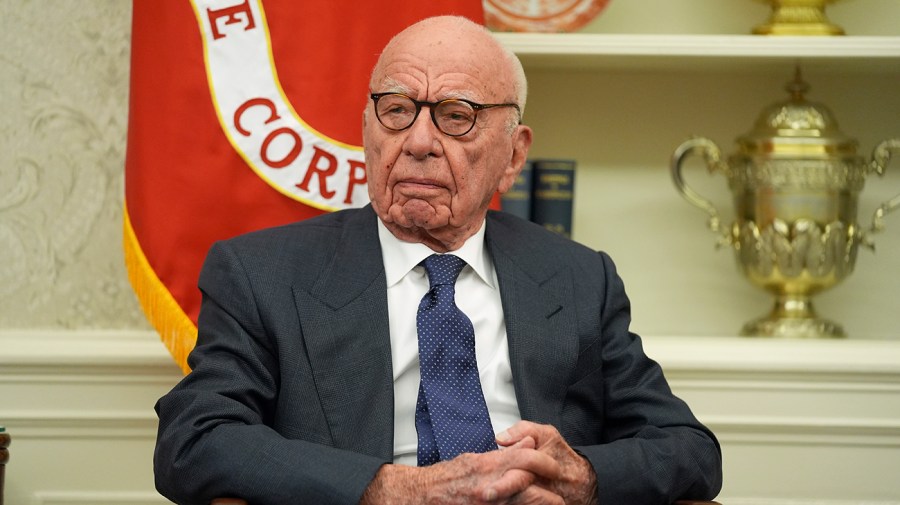
“Rupert Murdoch is in a class by himself, he’s an amazing guy,” President Trump said of the conservative media magnate, who sat smiling in the Oval Office this week as the newly elected president sang his praises.
Moments later, when a reporter in the room asked about a recent editorial in Murdoch’s The Wall Street Journal that argued the president’s trade proposals would lead to “the dumbest trade war in history,” Trump sang a different tune.
“I’m going to have to talk to him,” the president said.
“I’ve been right over The Wall Street Journal a number of times,” Trump said smirking in Murdoch’s direction as the White House pool cameras rolled. “I don’t agree with him on some things.”
Trump’s playful and public ribbing of one of the world’s most prominent media moguls underscored the years-long on-again, off-again relationship between the president and publishing tycoon, one that political and media observers told The Hill this week has reached a critical new stage.
“Trump knows Murdoch is still very powerful in the realm that he places more importance on than any other: the media. So, there are going to be risks to alienating him personally,” said Grant Reeher, a political scientist and senior research associate at the Campbell Public Affairs Institute.
“For Murdoch, there’s no value in getting more verbal about his personal feelings on Trump. He’s always been in a stronger position letting his publications do the talking.”
Murdoch’s widely read newspapers have been talking loudly during Trump’s first two weeks back in the White House.
The Journal has questioned Robert F. Kennedy Jr.’s stances on vaccines, knocked Trump for pulling security privileges for former top aides and admonished him for pardoning Jan. 6 prisoners.
The White House fired back forcefully at the Journal’s editorial this week, knocking Trump on trade, blasting out a memo to reporters titled “Death, Taxes and the Wall Street Journal supporting the hollowing out of American Manufacturing.”
It was a posture reminiscent of Trump’s attacks against Murdoch during the 2024 campaign, when he at one point called him a “globalist” who was trying to “tear me down.”
In more recent weeks, other Murdoch-owned media properties have painted a much rosier outlook on the president’s agenda.
Cover stories on the New York Post have featured full-page images of migrant arrests and deportations, with one front page headline on Inauguration Day praising Trump as ushering in the “Golden Age of America.”
On Fox News, the crown jewel of Murdoch’s U.S. media empire, Trump has received near universal praise from top hosts while the network has landed coveted exclusive interviews with top administration officials and the president.
Trump, an avid consumer of cable news, has hired several former Fox hosts to serve in key Cabinet posts and this week agreed to a wide-ranging interview that will air before Fox’s broadcast of the Super Bowl on Sunday with anchor Bret Baier.
Many saw Fox’s tapping of Lara Trump, a former co-chair of the RNC and wife of the president’s son Eric Trump, to host a show on the network as another sign of warming relations between the cable channel and the White House.
“It’s been obvious for a while now that Fox needs Trump more than Trump needs Fox,” said one leading Republican strategist.
Fox has for more than two decades been the top-rated cable news channel and seen increases in audience since Trump was reelected last fall.
The seemingly improving relationship between Trump and Fox stands in contrast to four years of tension between the two sides after he left office, punctuated by a massive defamation lawsuit that cost Murdoch’s business more than half a billion dollars.
“They don’t respect you, read the depositions. They have a fear, a loathing and a contempt for you,” Trump ally Steve Bannon said during a fiery Conservative Political Action Conference speech just months before the Murdochs settled a defamation lawsuit with Dominion Voting Systems out of court.
Bannon was referring to internal communications from Murdoch showing him privately casting doubt on Trump’s claims about the 2020 election.
Months later, Murdoch’s New York Post was vocally supportive of Florida Gov. Ron DeSantis (R) as he mounted a primary challenge to Trump for the GOP nomination for president.
Some observers say regardless of his personal feelings for Trump, Murdoch and his deputies are most concerned with catering to the views of his readers and viewers, a north star that is likely driving the Journal’s pushback on the White House in recent days.
“The willingness to take a stand is pretty notable given the way that other media companies, particularly social media companies, have caved to Trump,” said John Mark Hansen, a political science professor at the University of Chicago.
“It could be because Murdoch thinks he’s got some cred with Trump, and he can just deal with some of the wrath, or he just thinks he’s not going to lose anything with his readership.”
Representatives for both Murdoch and the White House declined to comment.
Since Trump’s November victory, some of the biggest leaders in media, tech and business have shown renewed interest in shoring up relationships with the new president.
Trump has boasted about this trend and expressed amusement that top executives like Jeff Bezos and Mark Zuckerberg are showing a willingness to work with him and make changes to their business with his agenda in mind.
But Murdoch remains just as the president said in the Oval Office this week: in a category of his own.
“Newspapers will probably stop running editorials. Publishing and journalism don’t need to be entwined in power politics,” media critic Ben Smith wrote in a recent column. “But if you want to be a mogul, as the Murdochs have learned over the decades, you can’t make yourself quite that easy to bully.”








